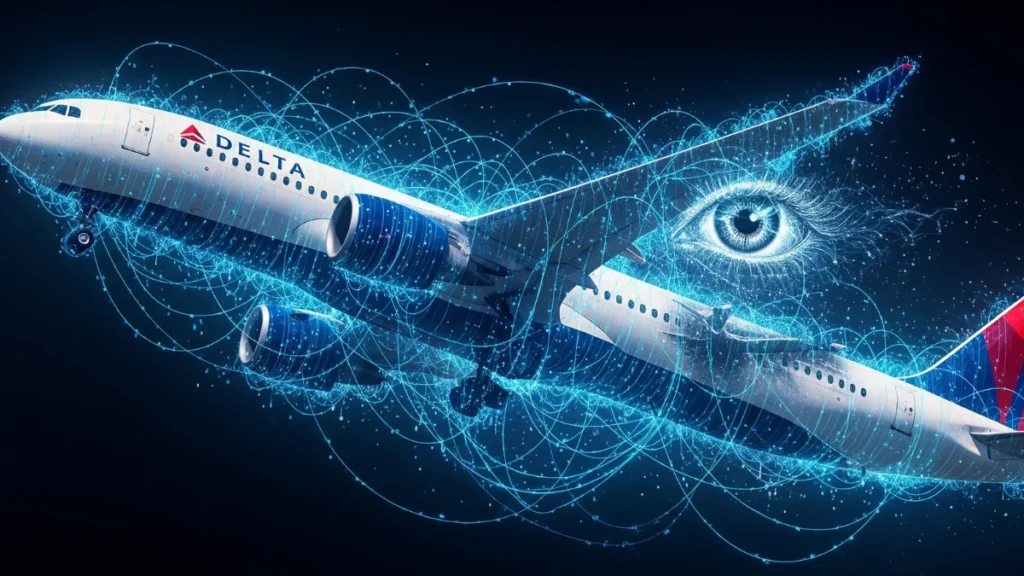Delta is ramping up AI-powered ticket pricing to personalize fares based on your behavior. While the airline calls it innovation, critics see it as manipulation.
What if your airline ticket wasn’t based on when you booked—but how much an algorithm thinks you personally can afford?
That’s not a hypothetical anymore. Delta Air Lines is expanding its use of AI-driven pricing tools to dynamically set fares, tailoring prices in real time based on everything from your browsing behavior to your purchase history. What started with just 1% of tickets in 2023 is now up to 3%—and by the end of this year, Delta plans to roll that out to 20% of domestic ticket sales, according to Delta President Glen Hauenstein.
It’s a bold shift that could redefine how we book air travel—or exploit travelers in the process.
Key Takeaways:
- Delta aims to AI-price 20% of tickets by year’s end.
- The AI uses real-time data and personal behavior to set prices.
- Critics, including Sen. Ruben Gallego, call it “predatory pricing.”
- Delta says the system is still in testing but early results are “favorable.”
- Privacy advocates worry AI is “hacking our brains” to charge more.
From Loyalty to Leverage: Delta’s “Super Analyst” AI
The technology powering this AI pricing system comes from Fetcherr, an Israeli startup that partners with several global airlines. Think of it as a “super analyst” that never sleeps—processing millions of data points to figure out the maximum price you, personally, might be willing to pay at a given moment.
During a recent investor call, Hauenstein described the shift as a “full reengineering of how we price and how we will be pricing in the future.” He touted the benefits of hyperpersonalization—offering customers a “custom experience every time.”
But many are asking: At what cost?
Personalization or Predation?
Senator Ruben Gallego (D-AZ) didn’t mince words. He labeled the system “predatory pricing,” accusing Delta of using artificial intelligence to “find your pain point and squeeze you for every penny.”
Consumer Watchdog analyst Justin Kloczko went even further, saying Delta is “trying to see into people’s heads” to exploit their willingness to pay. “They’re basically hacking our brains,” he warned.
The concerns go beyond fairness. There’s growing unease about how this kind of AI interacts with privacy—particularly as it draws from factors like your lifetime customer value, past purchases, and even what device or browser you’re using when you book.
Delta Isn’t Alone—But It’s the Most Transparent
Dynamic pricing isn’t new. Airlines, hotels, ride-share apps, and even fast-food chains like Wendy’s have all tested AI-based price adjustments. But what makes Delta stand out is its openness about the move—and how aggressively it’s expanding it.
“We like what we see. We like it a lot,” Hauenstein said during the earnings call. Still, he acknowledged that the model could “be very dangerous if it’s not done correctly.”
Even so, Delta isn’t pumping the brakes. In fact, it’s doing the opposite—gradually shifting away from traditional static pricing altogether. And that has consumers and privacy advocates on high alert.
Familiar Territory—With a High-Tech Twist
Airfare prices have always fluctuated due to demand, seasonality, and booking habits. But the AI angle adds a powerful new variable: You.
Not the general you. The specific you.
The model may treat a frequent flyer, a spontaneous booker, and a budget traveler very differently—even if they’re all booking the same flight.
Whether this becomes the new normal or sparks enough public backlash to slow things down remains to be seen. One thing’s for sure: the future of flying just got a lot more personal—and potentially a lot more expensive.
Conclusion
As Delta continues testing its AI-powered pricing, passengers should brace for more than just sticker shock. They’ll need to rethink how—and when—they book. Because soon, it might not just be the destination or the day that affects your fare.
It might be you.
